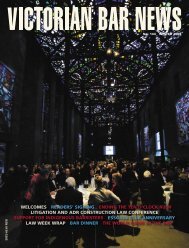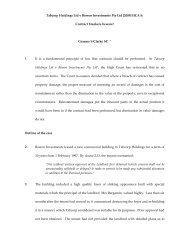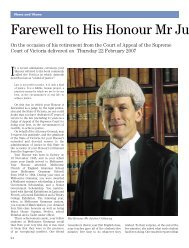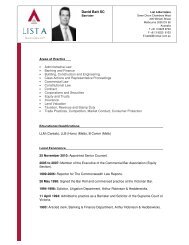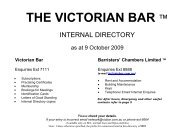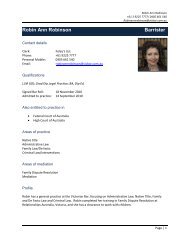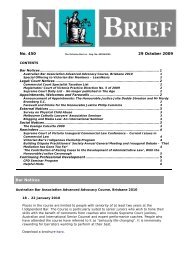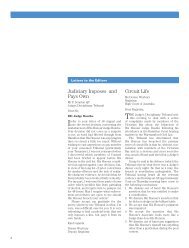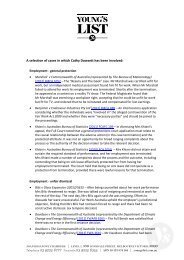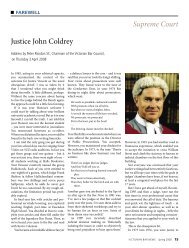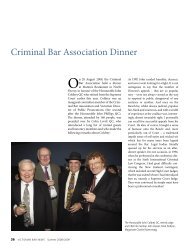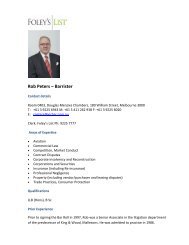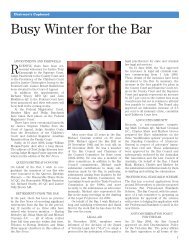Justice William Charles Crockett AO - Victorian Bar
Justice William Charles Crockett AO - Victorian Bar
Justice William Charles Crockett AO - Victorian Bar
- No tags were found...
You also want an ePaper? Increase the reach of your titles
YUMPU automatically turns print PDFs into web optimized ePapers that Google loves.
witness lies in the witness box or the lawyerthreatens or insults the court.If it is the lawyer who publishes thelibel, it makes no difference for thatpart of our law if the lawyer does soexpressly on instructions. That assertion,if sustained, may be critical on an issue ofqualified privilege, but it has no bearingon whether the lawyer is liable for publication.Defamation is not a part of the lawthat you want to flirt with.There is another civil wrong that maybe relevant where people of unequalpower are trying to reach a bargain. Thetort of intimidation is not often invoked,and when it is, it is mainly invoked in anindustrial dispute that has turned verynasty. It can be constituted by the use ofunlawful threats against a party to inducethat party to act against their interests.Take a bad case. On one side there is animpoverished cripple of little understandingand even less capacity. On the otherside there is a publicly listed companywith a team of lawyers. The lead lawyerlooks the victim straight in the eye andsays that although this little case doesnot register on their radar, they have themeans and the motivation to run the casefor weeks and, if necessary, to take it onsuccessive appeals. Therefore, they say,the victim should take their offer, whichis the only one they will ever make, eventhough the lawyer for the victim saysthat offer is inadequate to the point ofbeing derisory. That is intimidation. If thethreats are unlawful, and there is damage,there may be an actionable wrong.So far as I know, this tort has notbeen invoked in the context of settlementdiscussions. If the intimidation hasfailed, there may be no real damage. If ithas worked, the victim will not often bemotivated to do something about it. Thelitigant who kicks down the door may bethe one who was psychiatrically down atthe time of settlement and under-represented,but has recovered and is nowready and able to complain. Similar considerationsmay arise when a party seeksto set aside a settlement on the grounds ofundue influence.Our law of contract provides thatwhere people have agreed to seek to procurea result, there is an implied term ofthe agreement that each side will do whatit can to enable the other side to get thebenefit of the bargain. If therefore partiesto a dispute enter into a legally bindingagreement to seek to resolve the disputeby a process of negotiation, the law willimply a term of that agreement that theywill negotiate in good faith.42As often as not, it is plain enough thatone party does not wish to negotiate at all,let alone in good faith, and there is notmuch point in mumbling about refinedlegal obligations. But reasonable peoplewith decent lawyers occasionally benefitfrom being reminded of the necessarybasis of any successful negotiation. Thatis why, perhaps, you tend to find that thepeople who first refer to good faith may bethe last to show any evidence of observingit. Ultimately the whole process restson agreement, and without at least somegoodwill, if not good faith, you will notconvert the agreement to negotiate intoan agreement to settle.The Americans have a useful applicationof the doctrine of good faith. They sayit is to be implied in contracts where theparties are not equal. Key examples forthe Americans are insurance and employment.They then say that because the obligationarises by operation of law, breach ofit is a civil wrong, and not just a breach ofcontract. Because there has been found tobe a tort, the guilty party can be punishedwith exemplary damages for abusing theirpower and throwing their weight around.You might think that this would be a salutaryremedy to have in Australia. It wouldbe interesting to see if any parliament inAustralia would be prepared to introducesuch a law.Commercial law relating to negotiationsconsists mainly of statutoryadditions to the common law of contract.State and federal laws prohibit misleadingand deceptive conduct. Some provisionsare criminal as well as civil. The conductcomplained of has to occur in trade andcommerce (a limitation that was first putthere for constitutional reasons).Whether negotiations in a mediationoccur in trade or commerce will dependon the context. A court ordered mediationwith lawyers on each side may beone thing. An attempt to resolve, beforelitigation, a dispute between shareholdersor partners, or under an insurancepolicy, or about the sale of a painting,where lawyers happen to be present,would be something else. It is very common,and more than a little worrying, inthe mediation of commercial disputes,for the lawyers far to outnumber the feepaying litigants. You get more jockeys atthe barrier than horses. If you wish to saythat lawyers engaged in trying to resolve acommercial dispute are carrying on theirprofession rather than taking part in tradeor commerce — are we so old-fashionedthat we have to pretend that there is anexclusive dichotomy? — then the relevantmediation might have a more sterile airthan its sponsors would prefer. What doyou say to lawyers who turn up and say,“We are here to be commercial”? Why arethey there at all?The significance of being able to makea claim for misleading conduct is that if itis not available the party aggrieved hasto consider an action for fraud. Fraud issomething which it is nasty to allege anddifficult to prove. The introduction of therelevant trade practices laws removed thetemptation to make such a claim when itshould not have been made in the past.There is also a difference in this partof the law from the law of libel in a lawyerexpressly making a statement on the basisof instructions. With the law of defamation,”A said B murdered C” translatesinto “B murdered C”. But this is not thecase for the purpose of establishing a misrepresentationfor misleading conduct. Inthe context of negotiations some assertionsmade by lawyers might implicitlybe made, and only made, on instructions,but some lawyers get so close to identifyingwith their clients that this might be adangerous assumption.The function of equity is to remind usthat lawyers and other representativesof the parties in dispute are in it for theparties, and not for themselves. If theirown sense of vainglory conflicts with theirduty, they must deal with it immediately.We have all had to sit through grandstandingby lawyers or posturing by executiveswhere this very basic rule gets forgotten.We have all had to watch in action legendarynay-sayers who are heroic with otherpeople’s money behind them and whoappear to enjoy playing with the lives ofothers. They remind you of the lament ofGloucester to the Old Man on the heath:As flies to wanton boys, are we to the gods.They kill us for their sport.The notions of undue influence andclean hands may also be invoked inresponse to an endeavour to enforce asettlement procured unconscionably. In asufficiently dire case, a party can move toset aside an agreement obtained by conductthat is unconscientious (equity) orunconscionable (limited under statute).To come back to the criminal law, wedescribe as contempt of court the commonlaw crime of interfering with thecourse of justice. That offence may beconstituted by putting undue pressureon a litigant to deter them from pursuingtheir legal rights. Bullying a litigant intoaccepting a settlement that is manifestly



